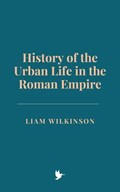This book explores the dynamic and multifaceted role of cities in one of history's most influential civilizations. This study delves into the origins, development, and evolution of Roman urban centers, examining their significance as hubs of culture, governance, trade, and innovation. By tracing the intricate interplay between Roman ideals and the practical realities of city life, the book highlights the adaptability and resilience of Roman urbanism across diverse geographies and epochs.
The chapters provide in-depth analyses of key themes, including urban planning, architecture, social stratification, public entertainment, and the integration of religion and education into city life. Special attention is given to the role of infrastructure, such as aqueducts, roads, and sewer systems, which underpinned the growth and sustainability of Roman cities. The transformative impact of the Roman military and its integration with urban centers is explored, alongside the pivotal role of immigration and multiculturalism in shaping the social fabric of cities.
The study further investigates the crises that challenged Roman urban life—economic instability, pandemics, and invasions—and the ways cities responded to these pressures, displaying both decline and resilience. The rise of Christianity and its profound transformation of urban identities, governance, and architecture is analyzed, offering insights into the cultural and spiritual shifts of late antiquity.
The final chapter examines the enduring legacy of Roman urbanism, tracing its influence on medieval, Renaissance, and modern cities. Through a synthesis of historical texts, archaeological evidence, and modern scholarship, the book demonstrates how Roman principles of urban planning and governance continue to shape contemporary urban environments.
This comprehensive exploration underscores the centrality of cities in Roman civilization, revealing their role as dynamic spaces where power, culture, and innovation converged. The study serves as a testament to the enduring relevance of Roman urbanism in understanding the complexities of urban life across time and space.

